Related Research Articles
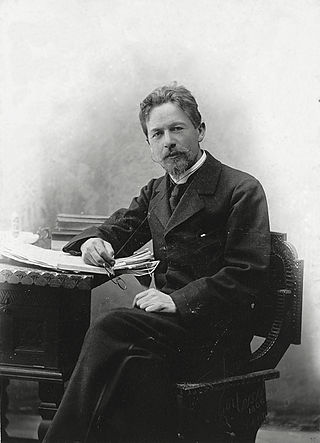
Anton Pavlovich Chekhov was a Russian playwright and short-story writer. His career as a playwright produced four classics, and his best short stories are held in high esteem by writers and critics. Along with Henrik Ibsen and August Strindberg, Chekhov is often referred to as one of the three seminal figures in the birth of early modernism in the theatre. Chekhov was a physician by profession. "Medicine is my lawful wife," he once said, "and literature is my mistress."

The Seagull is a play by Russian dramatist Anton Chekhov, written in 1895 and first produced in 1896. The Seagull is generally considered to be the first of his four major plays. It dramatizes the romantic and artistic conflicts between four characters: the famous middlebrow story writer Boris Trigorin, the ingenue Nina, the fading actress Irina Arkadina, and her son the symbolist playwright Konstantin Treplev.

Three Sisters is a play by the Russian author and playwright Anton Chekhov. It was written in 1900 and first performed in 1901 at the Moscow Art Theatre. The play is often included on the shortlist of Chekhov's outstanding plays, along with The Cherry Orchard, The Seagull and Uncle Vanya.

Eugene Onegin, Op. 24, is an opera in 3 acts, composed by Pyotr Ilyich Tchaikovsky. The libretto, organised by the composer himself, very closely follows certain passages in Alexander Pushkin's 1825–1832 novel in verse, retaining much of his poetry. Tchaikovsky's friend Konstantin Shilovsky contributed M. Triquet's verses in Act 2, Scene 1, while Tchaikovsky himself arranged the text for Lensky's arioso in Act 1, Scene 1, and almost all of Prince Gremin's aria in Act 3, Scene 1.

The Royal Ballet is a British internationally renowned classical ballet company, based at the Royal Opera House in Covent Garden, London, England. The largest of the five major ballet companies in Great Britain, the Royal Ballet was founded in 1931 by Dame Ninette de Valois. It became the resident ballet company of the Royal Opera House in 1946, and has purpose-built facilities within these premises. It was granted a royal charter in 1956, becoming recognised as Britain's flagship ballet company.
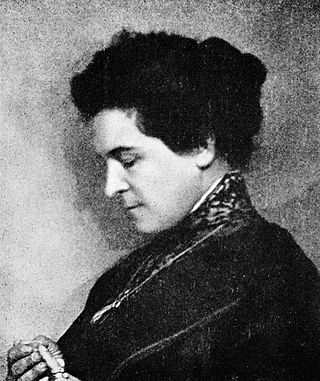
Olga Leonardovna Knipper-Chekhova was a Russian and Soviet stage actress. She was married to Anton Chekhov.

Sir Kenneth MacMillan was a British ballet dancer and choreographer who was artistic director of the Royal Ballet in London between 1970 and 1977, and its principal choreographer from 1977 until his death. Earlier he had served as director of ballet for the Deutsche Oper in Berlin. He was also associate director of the American Ballet Theatre from 1984 to 1989, and artistic associate of the Houston Ballet from 1989 to 1992.
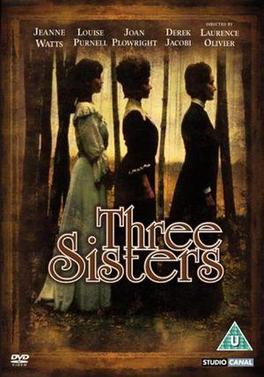
Three Sisters is a 1970 British drama film starring Alan Bates, Laurence Olivier and Joan Plowright, based on the 1901 play by Anton Chekhov. Olivier also directed, with co-director John Sichel; it was the final feature film directed by Olivier. The film was based on a 1967 theatre production that Olivier had directed at the Royal National Theatre. Both the theatrical production and the film used the translation from the original Russian by Moura Budberg. The film was released in the U.S. in 1974 as part of the American Film Theatre. This was a series of thirteen film adaptations of stage plays shown to subscribers at about 500 movie theaters across the country.
Sir Anthony James Dowell is a retired British ballet dancer and a former artistic director of the Royal Ballet. He is widely recognized as one of the great danseurs nobles of the twentieth century.
Three Sisters is a 1994 Russian film, based on Anton Chekhov's 1901 play of the same name. The movie was very successful in the former countries of the USSR and had one Nika Award nomination for the best cinematographer.

Laura Morera is a Spanish ballet dancer who was a principal dancer with The Royal Ballet until her retirement in 2023.

Viviana Durante is an Italian ballet dancer, considered one of the great dramatic ballerinas of recent times. She was a principal dancer of The Royal Ballet, American Ballet Theatre, Teatro alla Scala and K-Ballet. She is the artistic director of English National Ballet School and of the Viviana Durante Company.
David Drew was an English ballet dancer and Principal Character Artist of The Royal Ballet.
Irek Dzhavdatovich Mukhamedov OBE, is a Soviet-born British ballet dancer of Tatar origin who has danced with the Bolshoi Ballet and the Royal Ballet. Born in Kazan, he trained at the Moscow Choreographic Institute under the guidance of Alexander Prokofiev between 1970 and 1978. Upon graduation, he joined the Classical Ballet Company, where he spent three years touring around the world. It was with this company that he first danced Romeo, a role that was to become one of his most acclaimed. In 1981 he won the Grand Prix and gold medal at the International Ballet Competition in Moscow and was immediately invited to join the Bolshoi Ballet as a principal dancer, where he not only became Grigorovich's favourite danseur but went to become the youngest man ever to dance the leading role in Spartacus.
The Three Sisters is a 1966 American drama film directed by Paul Bogart and starring Geraldine Page and Shelley Winters. It is based on the 1901 play by Anton Chekhov.
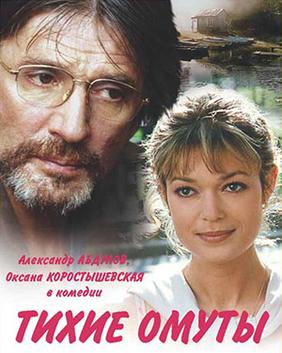
Still Waters is 2000 Russian romantic comedy-drama directed by Eldar Ryazanov.

Melissa Hamilton is a Northern Irish ballet dancer and a principal dancer with the Royal Ballet, London.
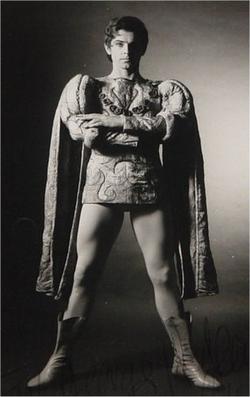
Derek Rencher was a British ballet dancer. A commanding figure among Royal Ballet character dancers for more than four decades, he was probably the most prolific performer in the company's history.
The Judas Tree is a one-act ballet created by Kenneth MacMillan in 1992 for the Royal Ballet. The music is by Brian Elias.

Tri sestry is a 1998 opera by Péter Eötvös to a Russian libretto by Eötvös and Claus H. Henneberg based on Anton Chekhov's play Three Sisters. It was the composer's first large-scale opera. The premiere at the Opéra National de Lyon, directed by Ushio Amagatsu, was conducted by Kent Nagano, who had commissioned the work. The production was then also shown in Paris, Brussels, and at the Wiener Festwochen festival in 2002. It became an opera played at several European opera houses including the Vienna State Opera in 2016 and the Oper Frankfurt in 2018.
References
- ↑ Staff writer, Winter Dreams, Productions, Royal Opera House, website, http://roh.org.uk/productions/winter-dreams. Retrieved 15 February 2016.
- ↑ Anton Pavlovich Chekov, Chekov: The Four Major Plays, in new translations by Curt Columbus (Chicago: Ivan R, Dee, 2005).
- ↑ Michael Pennington, Anton Chekov's Three Sisters: A Study-Guide (London: Nick Hern, 2007).
- ↑ Kenneth MacMillan, program note for Winter Dreams, Royal Ballet, Royal Opera House, London, February 1991.
- ↑ Anton Pavlovich Chekov, Three Sisters; A Drama in Four Acts (London: Methuen, 1983).